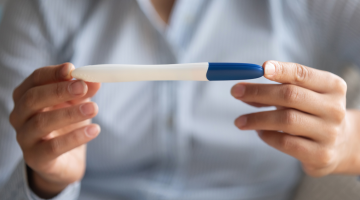How to Get Pregnant Fast with Irregular Periods

Are you wondering how to get pregnant with irregular periods? Well first off, you should know that it is absolutely possible to get pregnant with irregular periods. Secondly, identifying the cause of irregular periods can be simple, and in many cases making small lifestyle changes can regulate your periods and increase your fertility.
Research does indicate that women with irregular cycles are less likely to get pregnant compared to women who cycle regularly. However, women with irregular periods’ odds of conceiving depend on a few different factors:
- The cause of the period irregularity
- The extremity of the period irregularity
- If timed intercourse can be used effectively
In this article, we’re going to cover everything you need to know so you can get pregnant fast with irregular periods.
When are Menstrual Cycles and Periods Considered Irregular?
Women’s menstrual cycles commonly vary in length. An average menstrual cycle is considered to be 28 days long, but cycles ranging from 24 to 38 days are also considered normal.
Periods are generally considered irregular if any of the following are true:
- Menstrual cycles that are shorter than 24 days or longer than 38 days
- having periods in which cycle length varies by more than 9 days
- Bleeding or spotting between periods
menopause
What Causes Irregular Periods When Trying to Get Pregnant?
Irregular periods can have several different causes, and in some cases, they are the result of a combination of factors.
Hormonal Imbalances
Many different conditions and factors can cause hormonal imbalances and a variety of different hormones affect the menstrual cycle, including:
- Luteinzing hormone (LSH)
- Follicle-stimulating hormone (FSH)
- Estrogen
- Progesterone
In some cases, simple lifestyle changes can be used to correct hormonal imbalances, and in other more extreme cases, medications can be used as hormone therapy.
High or Low (Body Mass Index) BMI
Extremely high BMI or obesity can be the cause of other underlying medical conditions like Polycystic Ovary Syndrom (PCOS) or hypothyroidism that are also known to cause irregular periods. Obesity is associated with a higher incidence of menstrual irregularity, anovulation, and infertility.
Similar to how being overweight can cause irregular cycles, being underweight can also lead to period irregularity, menstrual disruptions, and fertility problems.
Overexercising
Fertility specialists recommend against rigorous and high-intensity exercise when trying to get pregnant as it can negatively affect a woman’s chances of getting pregnant. Research shows that intense exercise can cause menstrual irregularity and anovulation.
Now that doesn’t mean you shouldn’t skip out on exercise entirely. Research also shows that participant in normal or “non-vigorous” exercise for 30-60 minutes per day can reduce the risk of anovulatory infertility.
If you’re going to exercise, stick with walking or yoga.
Polycystic Ovary Syndrom (PCOS)
PCOS is one of the most common endocrine disorders that affect reproductive-aged women, and it is the number one cause of anovulatory infertility.
Irregular periods and/or anovulation are common symptoms of PCOS. As such, this can make getting pregnant with PCOS more difficult for some women, but not all women with PCOS experience infertility. A fertility consultation specific to PCOS will help you determine the appropriate treatment.
Age – Perimenopause
Perimenopause or “around menopause” occurs when the body starts naturally transitioning into menopause, the end of a woman’s reproductive years. During perimenopause estrogen and progesterone naturally decline, which causes irregular ovulation and periods. As a result, women’s chances of getting pregnant decline with age, and perimenopause marks the beginning of the end of her reproductive potential.
Perimenopause usually begins around age 47 and typically lasts 4-5 years. The official start of menopause is when a woman does not experience a period for 12 months.
Common symptoms of perimenopause include:
- hot flashes
- night sweats
- mood changes
- changes in cholesterol
- irregular periods
Women can still get pregnant during perimenopause, but they produce fewer eggs that are also of lesser quality.
Medications
Certain medicines can cause a disruption to the menstrual cycle and irregular periods. Some of these medications include:
- hormone replacement therapy
- thyroid medications
- blood thinners
- antidepressants
- chemotherapy drugs
- aspirin and ibuprofen
You’re Already Pregnant
If you’ve been experiencing normal periods and they suddenly stop, you might be pregnant! If you haven’t already, you should take a pregnancy test. In some cases, you may receive a false negative meaning that you are pregnant and are receiving a negative reading for some reason or another.
If you suspect you may be pregnant, be sure to see your doctor for a follow-up appointment and confirmation.
A Guide to Getting Pregnant Fast with Irregular Periods Naturally
Although irregular periods may make it more difficult for women to get pregnant, it is certainly possible. One of the main reasons getting pregnant is more difficult for women with irregular periods is that uncertainty regarding month-to-month cycle length makes tracking ovulation more difficult.
However, if intercourse can be timed properly the chances of getting pregnant increase exponentially. During a woman’s cycle, there is a time known as the fertile window, which refers to the few days before ovulation and the day you ovulate. Having sex every other day during this time period helps to ensure there is sperm present when ovulation occurs.
However, an irregular menstrual cycle may also be a sign of irregular ovulation. Some women ovulate at different times each month or skip months entirely without ovulating. As such, there are lifestyle changes you can make to help stimulate your ovaries and encourage ovulation.
Tracking Ovulation & Properly Timing Intercourse
Ovulation can be tracked in two main ways (1) ultrasound and blood work monitoring or (2) utilizing an at-home ovulation predictor kit.
Ultrasound and bloodwork monitoring track follicular development (aka follicular recruitment) and egg growth. By monitoring the egg development, medical providers are able to determine the window of time in which the woman is ovulating.
At-home ovulation predictor kits measure the amount of luteinizing hormone (LH) in urine. When LH levels start to rise, the ovaries are preparing to release an egg. When your LH level reaches a certain threshold, it indicates ovulation will occur in the next 12 to 36 hours.
Tracking ovulation allows couples to engage in sexual intercourse at the time provides the best chance of getting pregnant. When exactly is that?
Well, an egg is only capable of being fertilized during the first 24-36 hours after ovulation. Sperm on the other hand can live inside the woman’s body for up to 5 days; however, it can also take multiple days to reach the fallopian tubes (where an egg usually is during that first 24 hour period and where fertilization usually takes place) so couples are instructed to engage in intercourse every other day during starting with the detection of the rise in LH.
How to Improve Ovulation Naturally
Light Exercise
The benefits of light exercise for your overall health and fertility are well documented and innumerable. Specific to irregular periods and ovulation, light exercises like yoga, walking, and stretching help to clear blockages that impede blood flow. Exercising can help increase your blood circulation and ensure that nourishing nutrient and oxygen-rich blood flow is reaching your reproductive organs.
Research has shown that light exercise can significantly help to improve menstrual cycle regularity and ovulation especially for women with PCOS.
For optimal results, we recommend incorporating 30 to 60 minutes of low-intensity movement into your daily routine, especially if you are experiencing irregular periods or are having difficulty achieving pregnancy.
Reduce Stress
Stress is known to impact fertility negatively and struggling to get pregnant or worrying about irregular periods only causes more stress. Research shows that stress is significantly associated with menstrual cycle irregularity and that stress management is an important factor in improving a woman’s reproductive health.
Fortunately, studies have shown that implementing relaxation techniques can effectively reduce stress and negative emotions. If you’re feeling stressed we recommend trying the following relaxation techniques:
- yoga
- light exercise
- meditation
- breath focus
- anything else that helps you!
At CNY Fertility, we offer fertility support and many additional resources to those looking for a little empathy and encouragement. Click here to visit our fertility support page. In extreme cases, fertility specialists sometimes recommend professional psychological intervention.
Stop Smoking
Smoking is known to cause a laundry list of health problems and can severely impair fertility. Research has shown that smokers experience significantly more variable cycles and menses lengths than nonsmokers. Smoking is also associated with an increased risk of anovulation.
The good news is that the American Society for Reproductive Medicine (ASRM) found that women who quit smoking a year before trying to conceive can significantly improve their fertility rates.
Diet
According to Dr. Robert Kiltz, a reproductive endocrinologist, and fertility specialist here at CNY Fertility “our diet and other things we choose to consume is the single greatest factor we have control over that can radically increase the odds of conception and pregnancy.”
At CNY Fertility, we recommend eating a high fat, moderate protein, and low to no carbohydrate diet, nicknamed the B.E.B.B.I. Diet (Bacon, Eggs, Butter, Beef, and Ice cream made from full-fat heavy cream with little sugar). Eating a fertility diet can provide numerous benefits for your fertility like decreasing inflammation and improving ovulation and menstrual cycle regularity.
Research has shown that eating a fertility diet with low carbohydrates and high fat is associated with a lower risk of ovulatory disorder infertility. In addition, other studies have shown that the higher carbohydrate intake is associated with a greater chance of ovulatory infertility.
One recent study showed that when PCOS patients are enrolled in a high-fat low carbohydrate fertility they may resume regular menstruation and ovulation.
Take Fertility Supplements
Taking fertility supplements is one of the best ways to improve your fertility. The vitamins and nutrients included in fertility supplements play a vital role in female health and are essential for menstruation and ovulation. Make sue your fertility vitamins include the following, which are ll known to help increase period regularity:
- Inositol
- Acetyl – L Carnitine (ALC)
- B vitamins
- Coenzyme Q10 (CoQ10)
- Folate
- Fish Oil (Omega 3s)
- Vitamin C
- Vitamin D
- Zinc
Many of the supplements listed above have also been shown to help increase ovulation and menstruation specifically for patients with PCOS, they are included in our list of the ten best supplements for PCOS.
When to See a Fertility Specialist
Before visiting a fertility specialist, we usually recommend trying to conceive for one year (or six months, if you’re age 35 or older). However, if you have a condition known to affect fertility, for example, are experiencing irregular or infrequent periods, this rule doesn’t apply.
If you are experiencing irregular periods or are unable to conceive after trying for the specified time period, you and your partner should go for fertility testing. For women, your doctor can run a simple blood test to see if you are ovulating or not. From there they may recommend additional female fertility testing.
Depending on why you aren’t ovulating, or if you are experiencing other fertility problems, treatment possibilities include lifestyle change, treatment for an underlying medical condition, or fertility treatment.
Fertility Treatment Options for Getting Pregnant with Irregular Periods
Medicated Timed Intercourse
Medicated time intercourse is the simplest fertility treatment after timed intercourse. It is the exact same as a timed intercourse cycle but it includes the use of ovulation induction medications.
The most commonly used medications for medicated timed intercourse cycles are Clomid and Letrozole. Both are oral medications that help to increase fertility in two main ways, (1) increasing the number of mature high-quality eggs that are developed each cycle and (2) inducing ovulation. Depending on the results of your fertility workup, your fertility specialist will make a recommendation for Clomid vs Letrozole.
If Clomid or Letrozole aren’t effective at inducing ovulation, then fertility specialists will recommend moving onto gonadotropin medications. However, gonadotropin treatment is significantly more expensive so it is usually only used in conjunction with In-vitro Fertilization (IVF), but sometimes it is used with Intrauterine Insemination (IUI).
Medicated (Intrauterine Insemination) IUI
Medicated Intrauterine Insemination (IUI) cycles also utilize ovulation induction medications, especially if the patient was able to ovulate but didn’t get pregnant. during a medicated timed intercourse cycle. As mentioned above, occasionally gonadotropin medications, like Gonal F, are used to induce ovulation prior to an IUI.
During an IUI cycle, ovulation is tracked using ultrasound and blood work monitoring and one to two days after ovulation sperm is collected, concentrated, and deposited into the woman’s uterus. Sperm can also be collected and prepared ahead of time if the male partner can’t be present at the time of the IUI or if using donor sperm.
IUI procedures are very simple and minimally invasive and they produce great results, especially for couples with male fertility issues. During an IUI sperm are deposited directly into the uterus so they don’t have to swim through the cervix which can help overcome male fertility issues like low sperm count and poor motility.
(In-vitro Fertilization) IVF
In-vitro Fertilization (IVF) is considered the gold standard of fertility treatment. IVF treatment offers the highest success rates and quickest time to pregnancy of any Assisted Reproductive Technology (ART).
Fertility specialists recommend IVF treatment to patients who are discovered to have tubal blockages or severe male factor infertility during their initial assessment. IVF is also recommended for women of advanced age and those who have failed other treatments like ovulation induction and IUI. IVF can also be used for patients who have previously undergone tubal ligation surgery.
IVF involves a multi-week/month process in which eggs are removed from a woman’s ovaries, fertilized with sperm in a petri dish, grown inside a lab for several days (usually 3-5), then transferred into the female’s uterus to develop for the remainder of gestation.
IVF is used in conjunction with a multitude of medication protocols for patients with infrequent periods or ovulation issues. These medication protocols help to induce ovulation and produce more high-quality eggs and resulting embryos.
Final Thoughts on Getting Pregnant Fast With Irregular Periods
If you are experiencing infrequent or irregular periods, it is important not to get alarmed. For many women, making simple lifestyle changes can help to restore period regularity and improve their fertility naturally. For other women whose irregular periods may be a sign of more significant ovulatory issues, medications and fertility treatments can help you achieve pregnancy.
So remember, if you’re trying to get pregnant fast with irregular periods:
- Consider making lifestyle changes like incorporating more fertility-friendly foods and engaging in low-intensity exercise amongst other things.
- Seek help and schedule a consultation with a fertility specialist. Age plays a significant factor in a woman’s chance of getting pregnant so it’s important not to delay seeking help from a professional.
Perhaps most importantly, don’t lose hope. With the right lifestyle changes and appropriate medical help, most women with irregular periods are able to get pregnant relatively fast.





